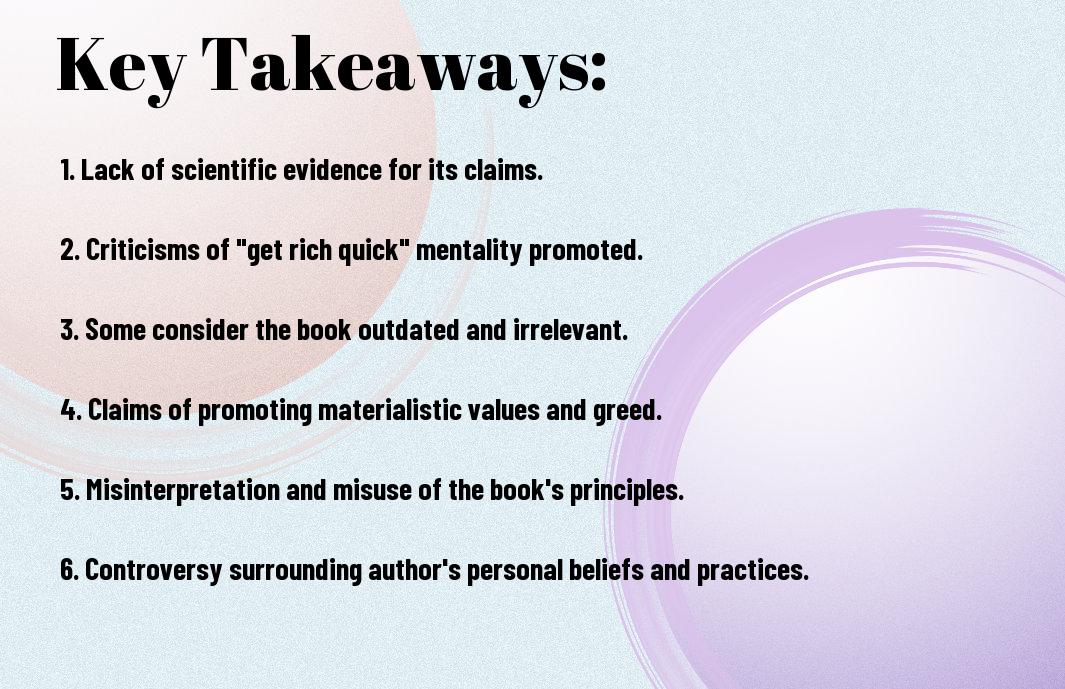Today, you may have heard of the timeless classic “Think and Grow Rich” by Napoleon Hill, which has inspired countless individuals to achieve success and prosperity. However, it is important to be aware of potential criticisms and controversies surrounding this influential work. Despite its widespread popularity and positive impact, there are some who have raised concerns about certain aspects of the book. In this blog post, we will explore these criticisms and controversies in order to provide you with a well-rounded understanding of “Think and Grow Rich” and its implications for your personal development journey.
Key Takeaways:
- Ethical concerns: Some critics have raised ethical concerns about the book’s emphasis on individual wealth accumulation and success, arguing that it promotes a narrow and potentially exploitative view of success.
- Lack of scientific evidence: The book’s claims and principles are often criticized for lacking empirical evidence and scientific validation, leading some to question the credibility of its teachings.
- Overarching emphasis on material wealth: While the book offers valuable insights into mindset and success, it has been criticized for placing too much emphasis on material wealth, without sufficiently addressing factors such as social responsibility and personal fulfillment.

The Success and Influence of “Think and Grow Rich”
While “Think and Grow Rich” has been widely celebrated for its impact on individuals throughout the years, it has also faced its fair share of criticism and controversy. Some readers and experts have raised concerns about the principles and teachings put forth in the book, questioning their validity and effectiveness. If you want to learn more about these criticisms, you can explore What are criticisms of the book, “Think and Grow Rich” by Norman Vincent Peale.
Historical Success of the Book
Since its initial publication in 1937, “Think and Grow Rich” has enjoyed immense success and recognition. The book has sold over 100 million copies worldwide and continues to be widely read and referenced by individuals seeking to improve their lives and achieve success. Its timeless principles have resonated with readers for decades, standing as a testament to the enduring power of its message.
Modern Influence and Relevance
The influence of “Think and Grow Rich” extends into modern times, with many individuals and leaders continuing to draw inspiration from its teachings. The book’s emphasis on the power of positive thinking, goal setting, and perseverance has proven to be enormously influential in the personal development and self-help genres. Its relevance in the contemporary world underscores the enduring value of its principles and the ongoing impact it has on the lives of countless individuals.
Major Criticisms of “Think and Grow Rich”
Despite its popularity and influence, “Think and Grow Rich” has not been immune to criticisms and controversies. While many people swear by its teachings and claim it has transformed their lives, there are others who have pointed out various criticisms of the book.
Philosophical Critiques
One of the philosophical critiques of “Think and Grow Rich” is the idea that it promotes a form of individualism that overlooks the systemic barriers to success. While the book emphasizes the power of the individual’s thoughts and desires, it has been argued that it fails to acknowledge external factors such as privilege, discrimination, and economic inequality that can significantly impact a person’s ability to achieve wealth and success. This criticism raises important questions about the book’s emphasis on personal responsibility and the potential for it to be used to justify systemic injustices.
Practical Criticisms
Another practical criticism of “Think and Grow Rich” is its reliance on anecdotal evidence and the lack of empirical support for its claims. While the book is filled with stories of individuals who have successfully applied the principles outlined in it to amass wealth, skeptics argue that these stories are not sufficient evidence of the book’s effectiveness. Critics maintain that the book lacks scientific rigor and fails to provide concrete evidence for its assertions. Additionally, some critics argue that the book’s focus on material wealth neglects other important aspects of a fulfilling and meaningful life, such as relationships, health, and personal development.
Controversies Associated with “Think and Grow Rich”
After the publication of “Think and Grow Rich” in 1937, the book has garnered both widespread praise and criticism. One of the most notable critiques of the book comes from Saber, who wrote an article titled A Critique Of “Think And Grow Rich” | by Saber. The article delves into the author’s interpretation of the principles and concepts presented in the book, raising concerns about their effectiveness and practical applications.
Controversial Interpretations
Some individuals have criticized “Think and Grow Rich” for its controversial interpretations and assertions. The book promotes the idea that your thoughts can directly influence your financial success, which some critics argue oversimplifies the complexities of wealth accumulation. The notion that simply thinking positively can lead to financial prosperity has sparked debates about the scientific validity of the claims made in the book. While many readers have found inspiration in the principles outlined in “Think and Grow Rich,” others have expressed skepticism about the practicality of its teachings.
Potential Misuse and Misinterpretation of the Theory
Another area of controversy surrounding “Think and Grow Rich” revolves around the potential misuse and misinterpretation of the theory presented in the book. While the author emphasizes the importance of ethical conduct and moral principles in the pursuit of wealth, some individuals have used the book’s teachings to justify questionable behavior and unethical practices in their quest for financial success. This has led to concerns about the potential negative impact of misapplying the ideas advocated in “Think and Grow Rich.”
To wrap up
While “Think and Grow Rich” has been a widely influential and acclaimed book, there have been criticisms and controversies associated with it. Some critics argue that the book promotes a overly materialistic mindset and oversimplifies the process of achieving wealth. Additionally, there have been accusations of plagiarism against Napoleon Hill, the author. Despite these criticisms, “Think and Grow Rich” continues to be a popular and enduring guide for those seeking to improve their financial situation.
FAQ
Q: What are some criticisms of “Think and Grow Rich”?
A: Some criticisms of “Think and Grow Rich” include the perception that the book glorifies wealth at the expense of ethical considerations, and that it oversimplifies the complex factors that contribute to success.
Q: Are there any controversies associated with “Think and Grow Rich”?
A: “Think and Grow Rich” has faced controversy due to some readers interpreting its teachings as promoting materialism and a singular focus on financial success. Additionally, some criticism has arisen regarding the lack of empirical evidence supporting the effectiveness of the book’s principles.
Q: Are there any ethical concerns related to the teachings in “Think and Grow Rich”?
A: While “Think and Grow Rich” is generally considered a self-help classic, some ethical concerns have been raised about the book’s emphasis on individual achievement without addressing its potential impact on societal well-being. Critics argue that the book may foster a competitive mindset that overlooks the importance of collaboration and social responsibility.

